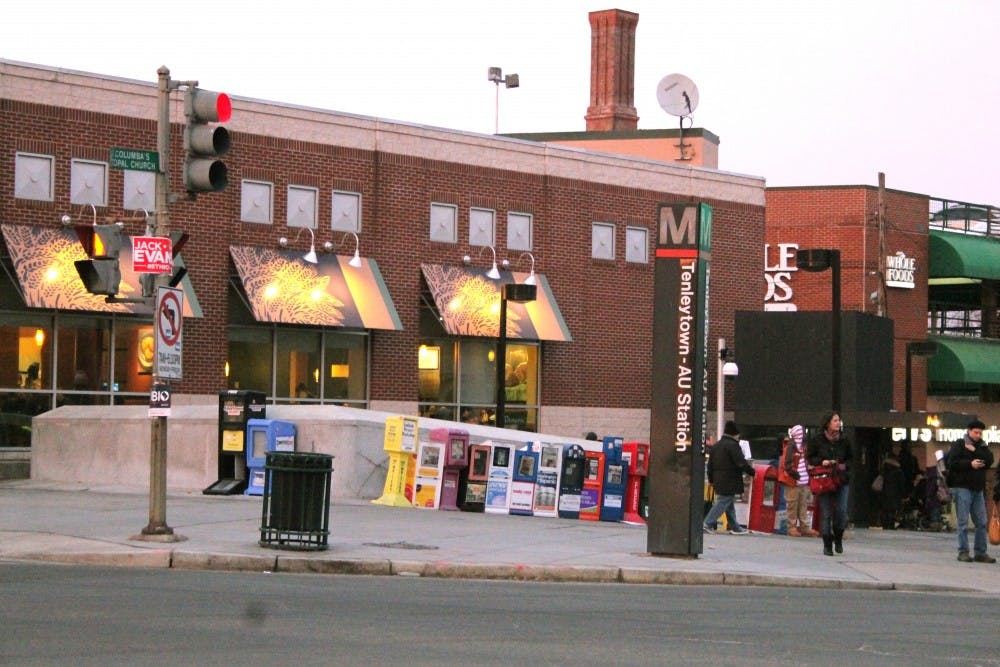Before leaving the house, American University students check their pockets for the essentials: their phone, earbuds of choice, their OneCard, and of course, the U-Pass. That one piece of trusty plastic is taken everywhere. It is the key to life beyond the campus grounds.
Yet, with recent safety issues, including a shooting at a Metro stop in early February and a derailment in 2021, some students say they don't always feel safe riding public transportation.
In the January monthly crime report from the Metro Transit Police, there were 15 aggravated assaults, 33 robberies, 22 motor vehicle thefts and more incidents that come to a total of 133 crimes on Metro property reported in the most serious category of crimes. Nearly half of these crimes occurred on Metrorail.
Metro Transit Police made 179 arrests, issued 97 citations/summonses in January with 5,531 “calls for service” for Metro Police. Compared to the same period last year, incidents of criminal activity on Metro have increased.
On Feb. 1, a shooting killed one metro employee, Robert Cunningham.
In a statement following the shooting, WMATA General Manager and Chief Executive Officer Randy Clarke, addressed the issue of gun violence by saying, “Gun violence must stop. Unfortunately, Metro is not immune to the violence that our country is experiencing right now. These senseless acts must be addressed together by our leaders and community.”
There are also concerns regarding the physical safety of train cars on Metrorail. Currently, the Blue Line is being updated by WMATA in response to the October 2021 derailment near Arlington Cemetery, which halted service during an evening commute that left riders to evacuate through the tunnels.
A recent report from the National Transportation Safety Board found that Metrorail’s 7000-series railcar wheels were pressed to the train axles wrong. Metro pulled 7000-series rail cars from operation for a year following the Arlington derailment.
The wheels will be changed over the next three years to make the Metro safer for riders.
Tiffany Minor, a communications specialist for the Washington Metrorail Safety Commission, has been a regular rider of the Metro since she was young. She said she feels that there could always be improvements and outlined in an interview with The Eagle that the commission’s job is to oversee the safety of the Metrorails themselves. She also discussed how, through inspections, it was discovered that WMATA sometimes does not follow their own safety plans.
“And then after [WMATA] put[s] these plans into place we, through our inspections, determine if they’re meeting those requirements that they laid out,” Minor said. “You’ve seen that sometimes we’ve had an order, like last year, [WMATA] had to take the 7000-series out of service and keep them out of service, and that was based on factual information that we got regarding them not exactly following the plans that they laid out to us.”
She also added that there have been current problems that the commision has been seeing through their work.
“A lot of the issues that we’ve recently seen through our audit work has to do with a culture that doesn’t necessarily, I don’t want to say put safety first, but [WMATA doesn’t] adhere to all of their policies,” Minor said.
Students have to trust this form of transportation daily.
Isabella Montini, a freshman in the School of Public Affairs, shared her views on the safety of the Metro, specifically at what hours she feels most comfortable.
“I normally usually feel safe depending on the time that I’m traveling,” Montini said. “But sometimes taking it later at night, around 10 p.m., can be a little scary, because there tends to be less people on [the Metro].”
She added that it is sometimes “worrisome” that there are not many Metro employees around in case an emergency happens, but believes that more police presence would not necessarily be the answer.
Afomia Felleke, a senior in the College of Arts and Sciences, has been taking the Metro since high school and agreed that her sense of safety depends on the time she’s riding the train, but added that this makes it difficult to travel to late night classes.
“Ironically enough, I think the Metro might be most safe when there’s more people, because there’s more witnesses,” Felleke said. “I do feel very unsafe when I have night classes going home and there’s a couple guys.”
Felleke also explained that she’s seen more WMATA personale on the cars.
Daniela Gerardi, a freshman in the School of International Service, added that for women to feel safer riding the Metro, WMATA could learn from her home, Rio de Janeiro, that has women-only cars, which could create a more “comforting” environment.
Melanie Orocio, a junior in School of Communication, has never gone by herself on the Metro except one time that made her “terrified.”
“I know for a lot of people it's a lot different but, I still haven't gotten comfortable getting on the Metro on my own without having someone to go with me that I rely on,” Orocio said, adding that extra security wouldn't help her confidence in the safety.
The Metro Media Relations Office and the Metro chief of police were asked to comment but did not respond.
This article was edited by Gabe Castro-Root, Jordan Young and Nina Heller. Copy editing done by Isabelle Kravis.
skolnick@theeagleonline.com





